Furball's tutorial
Contents
- 1 From bronze to plat, from noob to vet, the fun way.
- 2 FAQ
- 3 Bronze
- 4 Silver
- 5 Gold
- 6 Platinum
- 7 Forums
From bronze to plat, from noob to vet, the fun way.
There are obviously plenty of guides and "walkthroughs" and tutorials on how to best build an elements deck, how to speedrun your way to plat, how to be the pro to PvP2....this tutorial is NOT one of those. This tutorial will instead stress on creativity, uniqueness, and experimentation to get an idea of how the game works, and to fully immerse yourself in the cards instead of running straight to plat and getting hit with a feeling of ennui. To emphasize creativity, the deck examples I post here will all be created by me, while writing this article and testing it. The example decks are far from perfect, but instead of teaching mindless copy/pasting deck codes and grinding, they are supposed to give ideas and influence creativity. I mention a lot about creature control, permanent control, and sometimes use acronyms. If you're not familiar, don't worry about it. Either read up the definitions on the glossary or pick it up from playing many games. This is a comprehensive tutorial on all facets of the game without forcing you into using other peoples' decks. Remember, elements is a game based on creativity, so use that power as we learn how to go from a noob to a vet the fun way. Also, there is no reason to follow this guide down as I wrote it. Maybe you want to play a bit with gold/plat league before arena, maybe you want to jump straight into PvP, maybe you want to get a head start on killing false gods and getting money. The table of contents is your friend. The order I wrote it in is my recommended order, and is loosely ordered by difficulty, but feel free to jump around. Know how to build a rainbow already? Skip it! Want to learn how to farm False Gods for money first? Go read that up! Want to get introduced to the forums? Skip to the bottom! Already familiar with the game? Head straight down to the gold/plat sections! Just joined? Read up a bit on the bronze/silver sections! I'm here to introduce you to the game and teach you how to play, not what to play.
FAQ
General
Which element/rare do I pick?
- It's not a big deal, since eventually, you should be able to get your hands on all of them. If you want to make your life a bit easier though, I'd suggest fire or entropy or darkness. I wouldn't really recommend light or gravity. For the rare weapons, either go with one that you'll find useful, or trident/eternity, those two being the rares that AI3 doesn't drop. If your goal is to farm FGs as soon as possible, I'd recommend a lobotomizer, as it's one of the most versatile weapons against FGs.
What's the best element/card?
- There isn't one. Each element/card has its own purposes and uses. There really isn't a "best".
Omg! ______ (card) is OP! Why isn't it nerfed yet?
- Relax. Before screaming a card is OP, why don't you try it out for yourself? Actually build a deck revolving it and test it out. You'll see that it's most likely balanced. Just because a card counters your deck or strategy does not mean it's OP.
How come AI4 is so much harder than AI3? My deck that can nearly always beat AI3 loses so much to them!
- There is quite a huge difficulty spike between AI3 and AI4. Relax, and wait until you get some upped cards before you can consistently defeat them. In the meantime, head over to the Arena, a place where the difficulty jump from AI3 isn't so large.
Give me a good/unupped deck that beats AI3/AI4/FGs consistently!
- No. This guide is a guide on creativity, so I will not give you a deck that you can just use to mindlessly grind and lose track of the game. This guide is based on creativity, so use your own wits to create such a deck and share it with the community, maybe you'll come up with the next FG farmer. Remember, take the game slowly. There's no rush. Stop to smell the flowers and learn some unheard of combos.
How do I get rares/shards?
- AI3 have all the rares besides eternity and trident. If you want to get rares and shards, arena would probably be your best bet.
I don't think my dissipation shield or solar shield is working. Why?
- If you have sanctuary on the field, it cancels out the effects of those two shields.
What's this singularity that appeared on my field with negative attack that duplicated and stuff?!
- A singularity occurs whenever you play three novas, or two supernovas in one turn. These creatures will make life very miserable for you, so either quickly remove them, or you'll almost definitely lose the match.
So what's the best deck?
- There is no best deck. Each deck has its own purpose and counters.
Arena
How come I can't remove those 5 cards in the arena deckbuilding screen?
- Those are your copies of your oracle card. Your arena deck must include them and have 35 cards. If you can't think of a strategy to use, look at the wiki for your card. Maybe you'll discover a new synergy.
I upgraded extra hp, but how come when I play arena I still only have 100hp?
- The benefits only apply to your arena deck that other people will face.
How come I can't build a new arena deck?
- If your oracle card was the same as yesterday's, you cannot build a new arena deck.
Why does this arena deck have 1hp?
- Arena decks decay with time. After a week, nearly every single deck will have 1hp if they are still in the top 500.
How come I won an obscenely large amount of electrum from the arena?
- You probably beat a deck in the top 10. Those decks have multipliers attached on them, so you earn more electrum if you beat a deck in the top 10.
I just faced my own arena deck! Is this a glitch?
- No, you have a 1/500 chance of meeting your own arena deck if you choose to fight the league it is in.
I just faced somebody's deck two times in a row! Is this a glitch?
- Nope. Also a 1/500 chance of happening.
PvP
Wtf? How come weird things are happening in PvP? Is my opponent hacking?
- It is certainly a possibility, but more likely, it is just a desynchronization error.
Why is my opponent taking so long? I only take a few seconds to end my turn!
- The speed is due to the server. To them, it looks like you're taking a while.
My opponent just played a mark! They're hacking aren't they?
- No, marks can be won by winning tournaments.
How do I join a tournament?
- The rules are here.
Bronze
Goals
-Finish the quests
-Get comfortable with AI0-3
-Learn about monos/duos/trios
-Learn about rushes, stalls, and control decks
Getting started
Welcome to Elements! You've just opened up the game, picked an appropriate username you'd like to keep, and are now staring blankly at the screen with its catchy music and 12 elements. Which one should you pick? Don't think too hard about it, since eventually you'll be able to get all the cards. Just pick your favorite, although if you want a slightly easier time, fire/entropy/darkness would be a good choice and light/gravity would be harder. I'll make a table about the elements with their pros and cons.
| Element | Pros | Cons |
| quite defensive
Immortal creatures most powerful creature control |
expensive cards
weak attackers no permanent control | |
| has decent creature control
Decent creature abilities good shields |
no permanent control
not very offensive | |
| has creature control
has permanent control has quanta control has healing |
weak to Holy Light
takes a while to set up offense isn't great | |
| great offense
access to Poison great defense |
no healing
no permanent control also weak to Holy Light | |
| sturdy creatures
good defense has quanta control |
no permanent control
only soft creature control slightly pricey cards | |
| has Discord (strong quanta control)
has Antimatter (strong creature control is based on luck |
expensive cards
is based on luck | |
| strongest attackers
lots of creature control has permanent control has Immolation (fast quanta gain) |
very fragile creatures
not much defense | |
| insanely resilient creatures
can bypass shields has Black Hole (great quanta control) |
very expensive cards
hardly any offense | |
| has healing
cheap and efficient creatures fast |
very weak control
no permanent control | |
| good creatures
has healing |
no permanent control
no real creature control expensive cards | |
| can draw more cards
decent creatures |
no permanent control | |
| okay creatures
good creature control has Purify (poison counter) |
no permanent control
average speed |
Picked out your deck yet? Great! You can choose to make it a mono now, (remove all the other element cards besides the main element), but if you are new, go ahead and click AI0. The battle against the trainer should be over quickly, without you having too much trouble. Beat the trainer and collect your reward. You should have about 15 electrum now. The next two quests are also easily done. Simply remove a card from your deck, and then buy and sell a quantum pillar from the bazaar. You should have around 60 electrum now. Go ahead and tackle AI1. It's probably better to make your deck a mono now, since you'll notice it'll flow much smoother. After beating AI1 and above, remember to spin the reels. It could win you more cards! Finish the quest, and you should have around 100 electrum now. It's still not enough for you to comfortably mod your deck, so go ahead and fight AI2. AI2 actually have pre-built decks, so they might be a bit harder. After beating AI2 and the next quest, you should have about 150 coins, which is enough to start building your deck. I'll go over the main deck archetypes. While building decks, there is something called QI, or quanta index. Quanta index is the total amount of quanta of an element used divided by the numbers of quanta producing sources (pillars count as 5). The number should fall around 5, but it is not perfect. Stall decks can have slightly higher numbers while rush decks can have slightly lower numbers. The QI calculator is here, but it may be a bit outdated, so newer cards such as Seraph and Psion may not be accurate, but it'll do for most decks. QI is just a general guideline to see your quanta usage. Now what is a stall or rush deck? Let me explain.
Deck archetypes
Rush
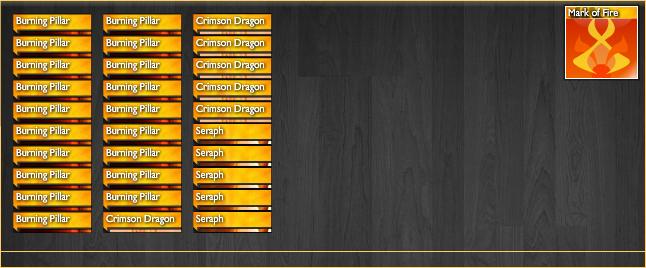
5f0 5f0 5f0 5f0 5f0 5f0 5f0 5f0 5f0 5f0 5f0 5f0 5f0 5f0 5f0 5f0 5f0 5f0 5f0 5f2 5f2 5f2 5f2 5f2 5f2 5fe 5fe 5fe 5fe 5fe 8po
QI:5.25

4t4 5i4 5i4 5i4 5i4 5i4 5i4 5i4 5i4 5i4 5i4 5i4 5i4 5i4 5i4 5i6 5i6 5i6 5i6 5i6 5i6 5id 5id 5id 5ie 5ie 5ie 5ie 5ie 5ie 8pp
QI:5.2
Notice anything about rush decks? They emphasize offense and speed. Rush decks often sacrifice defense and control for a full frontal attack, and often make use of very efficient attackers to kill the opponent before they can react. These decks are usually mono for smoother playing. These decks are often very simple, so if you want to build a first deck, I advise you to go for a rush deck. Try and pick efficient creatures with more attack than they cost. Notice how both the Crimson Dragon and Seraph have higher attack than their cost, as well as Toadfish. Those are the creatures you want for a pure offensive rush deck.
Control

5f0 5f0 5f0 5f0 5f0 5f0 5f0 5f0 5f0 5f0 5f0 5f0 5f0 5f0 5f4 5f4 5f4 5f4 5f4 5f4 5f6 5f6 5fb 5fb 5fc 5fc 5fc 5fc 5fc 5fc 8po
QI:4.8

58o 58o 58o 58o 58o 58o 58o 58o 58o 58o 58o 58o 58o 58o 58q 58q 58r 58r 58r 58r 58r 58r 593 593 595 595 595 595 595 595 8pm
QI:5.73
Essentially, control decks are slightly more defensive decks, based on getting quanta and card advantage over your opponent. If they just played a 10 quanta dragon, and you just used 2 quanta to destroy it, you've come out ahead. Notice that the creatures used in the control decks are more defensive than the fragile dragons in the rush decks. The first deck here is a mono fire that makes use of the more defensive Phoenix, as well as using Fire Bolt and Rage Potion to kill off opposing enemies. The second deck uses sturdy earth creatures and Basilisk Blood to shut down opposing creatures.
Denial
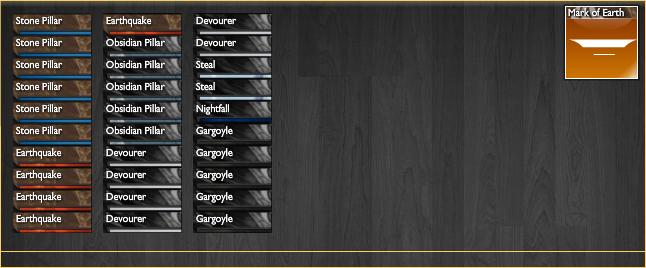
58o 58o 58o 58o 58o 58o 593 593 593 593 593 5uk 5uk 5uk 5uk 5uk 5um 5um 5um 5um 5um 5um 5up 5up 5uq 5uv 5uv 5uv 5uv 5uv 8pm
QI: 4.36 for darkness, 3.71 for earth
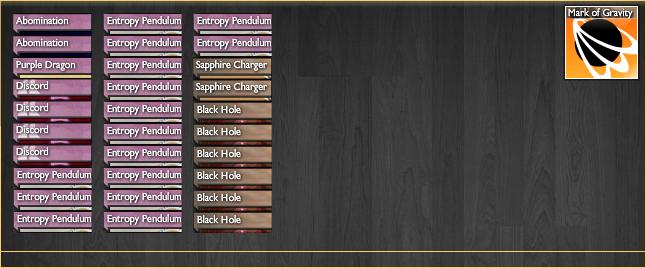
4ve 4ve 4vf 4vl 4vl 4vl 4vl 50u 50u 50u 50u 50u 50u 50u 50u 50u 50u 50u 50u 50u 50u 50u 55l 55l 55v 55v 55v 55v 55v 55v 8pl
QI: 4.21 for entropy, 3.95 for gravity
Whereas control decks focus on removing threats such as creatures, denial decks focus on preventing threats from coming out. These often involve cards such as Discord, Black Hole, Devourer, and Earthquake. The first deck uses earthquake to destroy opposing pillars, and then to slowly siphon away quanta with devourers. Notice how Gargoyle, the main offense in the first deck is a nice card that ties the darkness and earth synergies together. The second deck is an immensely powerful discord+black hole deck. While it requires discord, a rare, it is very powerful because discord scatters the opponent's quanta while black hole helps to drain it all away, completely shutting down their play. The creatures in the second deck are just there for some extra offense.
Stall
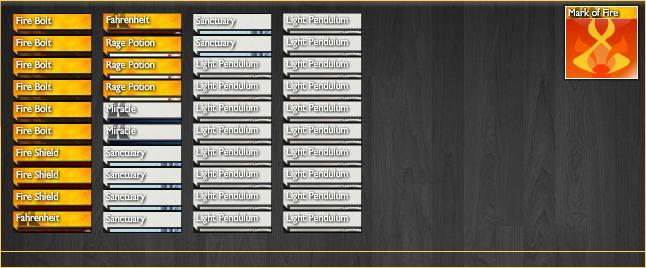
5f4 5f4 5f4 5f4 5f4 5f4 5f5 5f5 5f5 5f7 5f7 5fb 5fb 5fb 5li 5li 5lm 5lm 5lm 5lm 5lm 5lm 5mq 5mq 5mq 5mq 5mq 5mq 5mq 5mq 5mq 5mq 5mq 5mq 5mq 5mq 5mq 5mq 5mq 5mq 8po QI 5.1 for fire, 6 for light
This is a variation of the infamous firestall. Stalls often focus on either decking your opponent out or slowly whittling them to death while keeping yourself well healed and ready for anything they throw at you. Notice that QI in non-mono decks needs to be accounted for each element used, as well as how a stall is much bigger than the control and rush decks above. This deck uses Sanctuary as healing to keep itself alive while using all the fire cards as control to kill off enemy creatures. Once the enemy has no more creatures left, Fahrenheit will finish off the job if the enemy hasn't decked out yet. Stalls are very similar to control decks.
OTK
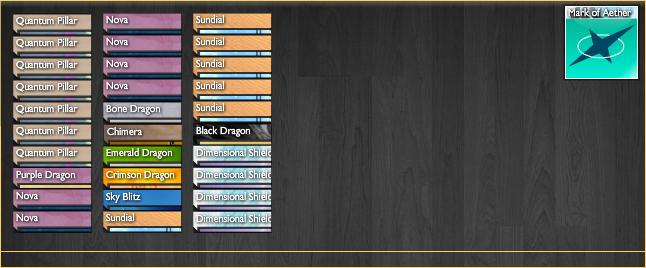
4sa 4sa 4sa 4sa 4sa 4sa 4sa 4vf 4vj 4vj 4vj 4vj 4vj 4vj 52h 560 5bt 5f2 5op 5rp 5rp 5rp 5rp 5rp 5rp 5ul 61t 61t 61t 61t 8pu
OTK decks are a special type of combo that often are similar to stalls. They need to keep themselves alive and dig through their entire deck for a certain combo (in this case, 5 dragons+Sky Blitz+Chimera for instant 100 damage) that will win them the game in one turn. You'll often see Golden Hourglasses, Sundials, or Dimensional Shields in OTks as they try to stay alive. If you're interested in OTK decks, Chapuz has a neat OTK deck building guide here that you may want to check out if you have the time.
Break

5l8 5l8 5l8 5l8 5l8 5l8 5l8 5l8 5l8 5l8 5l8 5lg 5lh 5lh 5lh 5lh 5lh 5lh 5lm 5lm 5lm 5lm 5lm 5lm 5oi 5oi 5oi 5oi 5oi 5oi 8pr QI: 6 for air, 5 for light
A break is a specialized type of deck that is meant to counter stalls and controls. They will often use very defensive creatures so that control won't do much damage, and slowly chip away at the opponent. Immortal creatures are great for this task, such as a flying Morning Star or just a simple Immortal.
Monos, duos, and trios
The next section will cover monos/duos/trios. See if you can identify whether the decks are rush, control, stall, or a combination.
Mono

5uk 5uk 5uk 5uk 5uk 5uk 5uk 5uk 5uk 5uk 5uk 5ul 5ul 5ul 5ul 5ul 5ul 5um 5um 5um 5um 5um 5um 5up 5up 5up 5uq 5uq 5us 5us 8pt
QI:5.33
Mono decks are decks that only use one element. The good points about these types of decks is that you don't have to worry that much on different quanta balance and can have an overall smoother deck. The bad part is that you lose access to many synergies between elements, and not all elements have ways to deal with annoying shields or creatures. While most mono decks of an element are decent, not being complete or having access to other cards/strategies limits them. Mono decks are very simple, so try and build one of these at first if you can. You will be surprised at how far a mono rush deck can get you.
Duos
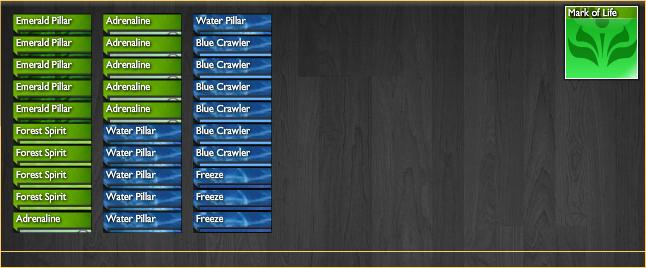
5bs 5bs 5bs 5bs 5bs 5c1 5c1 5c1 5c1 5c7 5c7 5c7 5c7 5c7 5c7 5i4 5i4 5i4 5i4 5i4 5i4 5i6 5i6 5i6 5i6 5i6 5i6 5i7 5i7 5i7 8pn QI:5.33 for life, 4.83 for water
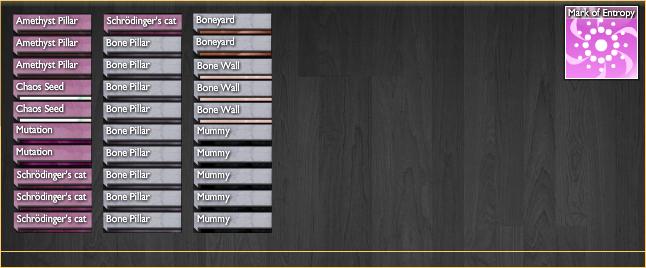
4vc 4vc 4vc 4vi 4vi 4vk 4vk 4vq 4vq 4vq 4vq 52g 52g 52g 52g 52g 52g 52g 52g 52g 52n 52n 52r 52r 52r 52t 52t 52t 52t 52t 8pj QI 4.5 for entropy, 5.22 for death
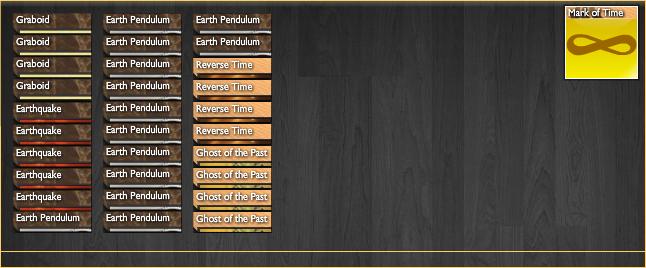
590 590 590 590 593 593 593 593 593 5aa 5aa 5aa 5aa 5aa 5aa 5aa 5aa 5aa 5aa 5aa 5aa 5aa 5rk 5rk 5rk 5rk 5ru 5ru 5ru 5ru 8ps QI:4.09 for earth, 4.74 for time
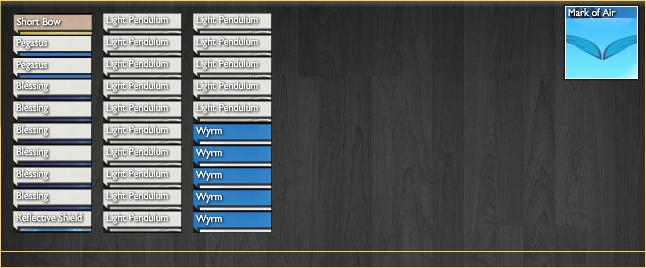
4tb 5lb 5lb 5lf 5lf 5lf 5lf 5lf 5lf 5lg 5mq 5mq 5mq 5mq 5mq 5mq 5mq 5mq 5mq 5mq 5mq 5mq 5mq 5mq 5mq 5oe 5oe 5oe 5oe 5oe 8pr QI: 5.12 for air, 3.55 for light
As you can see, duos can be balanced with either pillars or pendulums. The main benefit duos have over monos is that they are more flexible. With two elements to play with, you get more combos and synergies. The bad part is that duos are less stable than monos, since they require two different types of quanta to function. Remember, when making a duo, try and make sure the two elements have some kind of synergy with each other. Do not just put two elements together to include cards you like if they don't have anything in common.
Note the synergy between each of the two elements in the decks above. The first uses Adrenaline that can be placed on Blue Crawlers, while Forest Spirits grow with water quanta. The second focuses on using Schrodinger's Cat to build up defenses and offense. The third deck uses Graboid and Ghost of the Past for damage, but also uses earthquake and Reverse Time for lots of creature control and denial. Finally, the last deck makes use of Blessing to boost the attack of Pegasus and Wyrm, both of which can then be doubled with dive.
Splash

5bs 5bs 5bs 5bs 5bs 5bs 5bs 5bs 5bs 5bs 5bu 5bu 5bu 5bu 5bu 5bu 5c2 5c2 5c7 5c7 5c7 5c7 5c7 5c7 61q 61q 61q 61q 61q 61q 8pu QI: 12 for aether, 4.2 for life
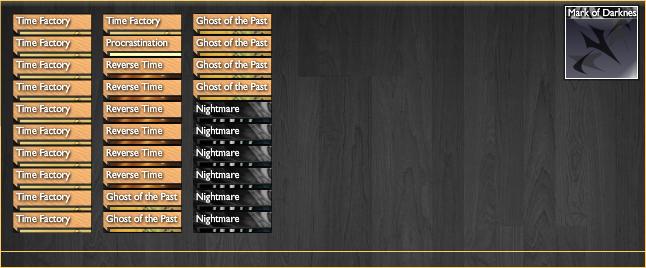
5rg 5rg 5rg 5rg 5rg 5rg 5rg 5rg 5rg 5rg 5rg 5rj 5rk 5rk 5rk 5rk 5rk 5rk 5ru 5ru 5ru 5ru 5ru 5ru 5v1 5v1 5v1 5v1 5v1 5v1 8pt QI: 12 for darkness, 4.91 for time
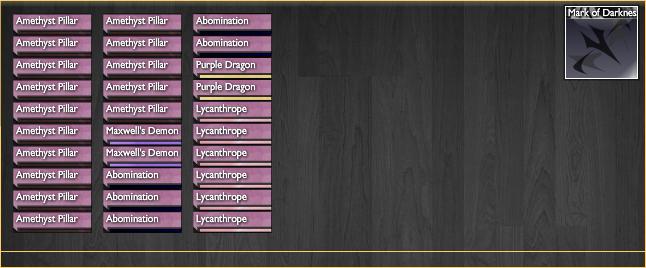
4vc 4vc 4vc 4vc 4vc 4vc 4vc 4vc 4vc 4vc 4vc 4vc 4vc 4vc 4vc 4vd 4vd 4ve 4ve 4ve 4ve 4ve 4vf 4vf 4vh 4vh 4vh 4vh 4vh 4vh 8pt QI: 12 for darkness, 4.73 for entropy (Technically this is not really a duo deck, but I am counting it here as one since it makes use of the darkness quanta)
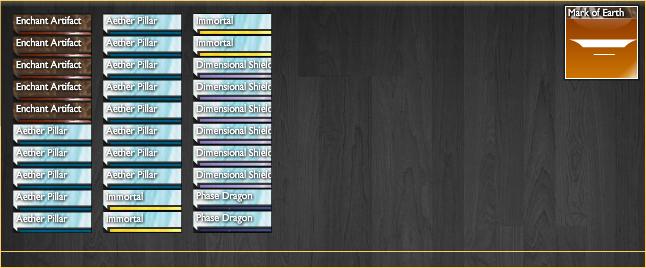
592 592 592 592 592 61o 61o 61o 61o 61o 61o 61o 61o 61o 61o 61o 61o 61o 61s 61s 61s 61s 61t 61t 61t 61t 61t 61t 61v 61v 8pm QI 10 for earth, 6.62 for aether
Wait! You say! What's up with that huge QI? Splash decks are often fine even with that huge QI, since they use the mark to fuel that quanta. Often, splashed cards should cost between 0-2 quanta, so you can get out one every other turn. In the first deck, mono life lacks creature control cards, so Lightning is there to help kill off opposing creatures, such as dragons. The second deck is a ghostmare, a very powerful combo of using Nightmare to fill up your opponent's hands with ghosts, using reverse time to lock down their draws, and killing them with the ghosts. The third deck is a splash deck that uses the darkness from the mark to power the lycanthropes. The last splash deck is an earth/aether duo using Enchant Artifact to protect the fragile Dimensional Shields. You'll notice the last deck has noticeably higher QI, but that is because it is a stall, so it's QI can be a bit higher.
Trios

5bs 5bs 5bs 5bs 5bs 5bs 5bv 5bv 5bv 5bv 5c6 5c6 5c6 5c6 5lk 5lk 5oc 5oc 5oc 5oc 5oc 5oc 5oc 5oc 5oj 5oj 5oj 5oj 5oj 5oj 8pr QI 8 for life, 4.67 for air, n/a for light
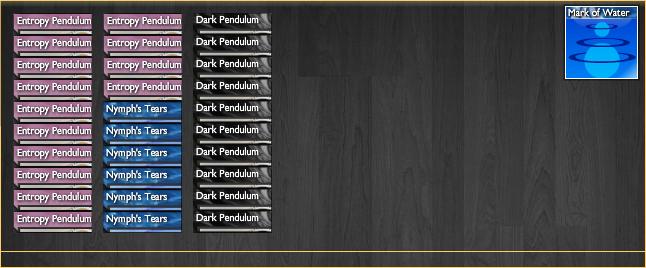
50u 50u 50u 50u 50u 50u 50u 50u 50u 50u 50u 50u 50u 50u 5ig 5ig 5ig 5ig 5ig 5ig 606 606 606 606 606 606 606 606 606 606 8pp QI 3.23 for water

55t 55t 55t 55t 55t 58o 58o 58o 58o 595 595 595 595 595 595 596 596 596 5uk 5uk 5uk 5uk 5up 5up 5v0 5v0 5v0 5v0 5v0 5v2 8pl QI 5.5 for darkness, 4.5 for earth, 10 for gravity
Trios are the last type of deck I will get to in this section since they are very complex. Don't be fooled by the wonky QIs. the first two decks involve creating new creatures that will use and provide more quanta. As a whole, theoretically, trios should be better than duos, but forcing three elements into one deck makes it very cramped and unstable. Therefore, to simplify your job a bit, use a splash of one element, and pillars to balance out the others like the third deck. Trios often involve complex strategies that make use of all elements. When making a trio, make sure each element synergizes with each other or else you'll have a clunky deck.
The first deck focuses on using Firefly Queen to produce Firefly, which in turn synergize with Rustlers for more quanta. Hope is there as a way of defense as well. The second deck makes use of Nymph's Tears to summon entropy and darkness nymphs to Antimatter and cast Liquid Shadow on the opponent's creatures, so they turn into negative vampires, healing you and damaging the opponent. The third deck is a voodoo deck that focuses on casting Gravity Pull on a Voodoo Doll, increasing its health, then watching the opponent hit themselves.
General deckbuilding tips
- Unless you're using a stall or stallish deck, stick with 30 cards. It'll help you get better draws. Of course, you could argue 31 cards helps in a deadlock, but those rarely happens. If it makes you feel better, go with 31, but I still recommend 30.
- Use QI, although take it with a grain of salt. It'll help you balance your deck better, but not perfect.
- When using multiple elements, try and make it so there's a synergy between them.
- Use 1 copy of a card in your deck if it's not that important but you want it now and then. 2 if it's not that important, but you want it to come up. 3 if it's a card that you can either do or do without during the course of the game. 4 if it's a card you definitely want to see come up. 5 if it's a card that's pivotal to your deck and you want it in your opening hand. 6 if that's the card your entire deck is focused around.
- When building a deck, start with a combo or synergy you'd like to see. Don't just cram in your favorite cards.
- A deck should be focused on one synergy. Two max. Adding more just unstabalizes a deck.
- A regular deck should probably have around 8 creatures. Any less and it's vulnerable to control.
- I recommend at least 2-3 permanent control cards in a deck, as well as 1-4 creature control cards if you're going for a balanced deck.
- You don't have to have a weapon or shield in a deck. If you do but don't know what to add, don't overlook the simplicity of Shield or Short Sword.
- If using shields, try to make it so that it won't be a big hindrance if it gets stolen. The last thing you want is an opponent using your own cards to turn against you.
- When in doubt, start with a 6/6/18 or a 6/6/6/12 build and work from there.
- Test, test, test. You'll never improve if you never actually test out your deck and see what it needs.
Example deck
For an example, let's try building a deck right now. Let's say I love the devouring aspect of Otyugh from gravity. I want to buff them with Plate Armor to eat more things.
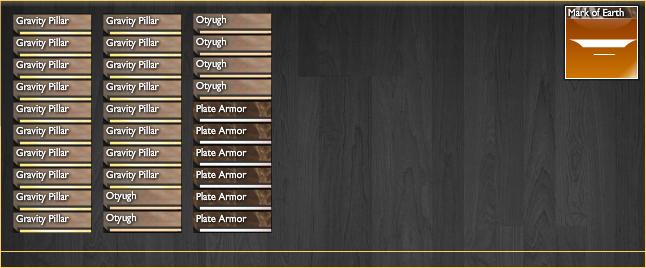
55k 55k 55k 55k 55k 55k 55k 55k 55k 55k 55k 55k 55k 55k 55k 55k 55k 55k 55r 55r 55r 55r 55r 55r 58t 58t 58t 58t 58t 58t 8pm
Immediately, you can see some things are lacking. The QI for gravity is 1.67, and there's not much offense or defense offered besides the Otys. Let's add some chargers for some offense.
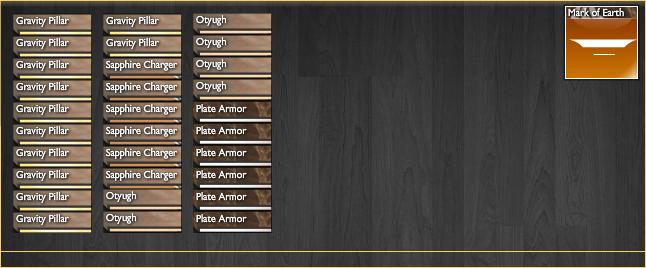
55k 55k 55k 55k 55k 55k 55k 55k 55k 55k 55k 55k 55l 55l 55l 55l 55l 55l 55r 55r 55r 55r 55r 55r 58t 58t 58t 58t 58t 58t 8pm
The QI for gravity is now a perfect 5. You can go ahead and run with this, but let's say you want to mod it more. What about some extra defense for creatures that slip past your Otys?

55k 55k 55k 55k 55k 55k 55k 55k 55k 55k 55k 55k 55l 55l 55l 55l 55p 55p 55r 55r 55r 55r 55r 55r 58t 58t 58t 58t 58t 58t 8pm
Shields can be used for creatures too big to devour, as well as the fact that you can slap on armor onto your opponent's creatures to stop them from reaching you. Now let's polish up the deck.
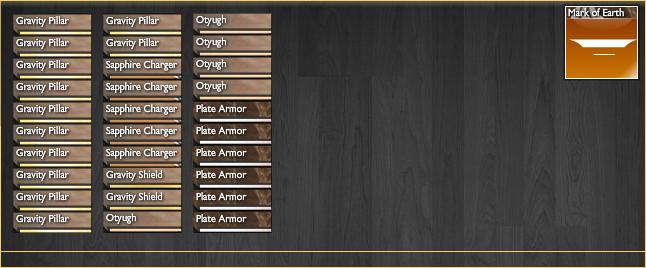
55k 55k 55k 55k 55k 55k 55k 55k 55k 55k 55k 55k 55l 55l 55l 55l 55l 55p 55p 55r 55r 55r 55r 55r 58t 58t 58t 58t 58t 58t 8pm
6 Otys are probably overkill for control, so I made it 5. I swapped in another charger for more stable offense. Now you have a QI of 5 again for gravity, and a working deck. Be sure to test out your decks against the AI3s to see what your deck lacks or has too much of.
Finishing the quests
Now that you're familiar with the basics of deck building, build yourself a nice rush deck to take care of AI3. The examples above are only meant as inspiration for you to get ideas from, and copying them is not advised. The whole period of the game now is for you to learn. Learn the weaknesses, strengths, and counters of different cards and strategies.
AI2
AI2 decks are here:[1] but in general, there are:
![]() +
+ ![]() +
+ ![]()
![]() +
+ ![]()
![]() +
+ ![]() +
+ ![]()
![]() +
+ ![]() +
+ ![]()
![]() +
+ ![]() +
+ ![]() +
+ ![]()
![]() +
+ ![]() +
+ ![]()
![]() +
+ ![]() +
+ ![]()
![]() +
+ ![]() +
+ ![]()
![]() +
+ ![]() +
+ ![]()
![]() +
+ ![]() +
+ ![]()
![]() +
+ ![]() +
+ ![]()
![]() +
+ ![]() +
+ ![]()
AI3
AI3 decks are here:[2]
There are:
![]() mono aether deck
mono aether deck
![]() +
+ ![]() +
+ ![]() Firefly Queen deck
Firefly Queen deck
![]() +
+ ![]() Voodoo Doll deck
Voodoo Doll deck
![]() +
+ ![]() deck based on death effects
deck based on death effects
![]() +
+ ![]() stall deck
stall deck
![]() +
+ ![]() voodoo doll deck, this time with Rage Potion
voodoo doll deck, this time with Rage Potion
![]() +
+ ![]() mono gravity with spark splash
mono gravity with spark splash
![]() +
+ ![]() deck with mutations
deck with mutations
![]() +
+ ![]() deck based on Crusader and Owl's Eye
deck based on Crusader and Owl's Eye
![]() +
+ ![]() +
+ ![]() Scarab based deck
Scarab based deck
- rainbow only rainbow deck
![]() +
+ ![]() Dune Scorpion deck
Dune Scorpion deck
![]() +
+ ![]() Steam Machine deck
Steam Machine deck
Learn these decks and their strategies. There really isn't much advice I can give to you for getting 150 and 500 score. It may seem daunting at first, but if you use this time to experiment and learn and test vs AI3, you should get there in no time. After that, pick out the rare weapon of your choice, but don't spend too much time thinking. Just like your starting element, it doesn't really matter that much, so just pick the one that you think would be most useful to you right now.
Silver
Goals
-Start collecting rares and all kinds of cards
-Learn about rainbow decks and how to build them
-Learn about the oracle and arena
-Abusing the oracle daily for fun and profit
-Learn some deck strategies and PvP1 metagaming
Continuing after the quests
Gotten a rare weapon? Got that score? Learned a bit about the cards? Good job! Remember to keep spinning the reels when you've won to get the chance to get cards. I'd advise you save the cards you get even if they don't fit into your deck, since you might want to build different decks later, or in the arena. What is the arena? Keep reading and I will get to that.
Building your first rainbow
In the previous section, I only talked about monos, duos, and trios (Besides that OTK deck that was a rainbow). As you've seen, they got steadily harder and harder to balance, and grew more and more unstable as new elements were added. So what is a rainbow? A rainbow is a deck archetype that uses cards from elements of most if not all elements. Wait, you ask, how can you fit so many pillars into a deck and balance it? And that is where these come in.
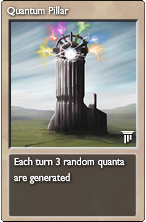
Quantum Pillars are the backbone to most rainbow decks as it generates an average of 0.25 quanta per element per pillar per turn. This will allow you to access the powerful lightning, fast frog, and sneaky steal into one smooth deck.
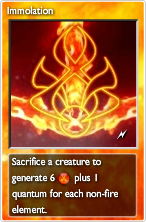
Immolation is another card that some rainbows use, and that is where the distinction between rainbows comes from. One type of rainbow is the QPbow, which uses quantum pillars and novas to provide quanta. The other, is an immobow, which uses immolations to provide quick bursts of quanta of all elements. Immobows are faster, but lack the stability of QPbows. Essentially, use immobows if you're the more risky, speedy type, while use QPbows if you're more interested in reliability and stability. Additionally, immolation stresses ![]() way more, so balance a rainbow deck with immos around that. Immolation can also be used in mono fire or duos (just 6 Photons for fodder) as quick quanta generation.
way more, so balance a rainbow deck with immos around that. Immolation can also be used in mono fire or duos (just 6 Photons for fodder) as quick quanta generation.
And of course, Nova, the true backbone to rainbows. Use at least 4 of these in your rainbow for consistent quanta.
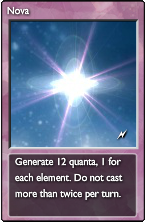
So to recap. What is a rainbow? It's a deck that uses either quantum pillars, immolation, or nova to have quanta for ALL elements and get access to all types of cards. Rainbows are the most flexible decks out there, but their weakness is that they are extremely vulnerable to black hole, QPs can be luck based, and immobows are fragile and aren't very stable to much control.
- rainbow +has access to cards of all elements, +more stable than some duos and trios, -can't use too much quanta of an element, -very vulnerable to black hole, -immobows can't handle much control
Let's build a rainbow together (both kinds). I'm trying not to impose too much rules to restrict creativity, so just use this as a base to build off of.
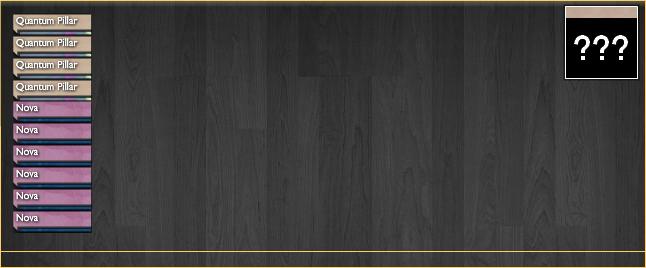
4sa 4sa 4sa 4sa 4vj 4vj 4vj 4vj 4vj 4vj

4vj 4vj 4vj 4vj 5f9 5f9 5f9 5f9 5f9 5f9 5l9 5l9 5l9 5l9 5l9 5l9
These are probably the bases that you should use for an immobow or QPbow. (I didn't put a mark to show it's not that important).
Now what? Well, besides fire in an immobow, you want to use no more than 4 quanta of a certain element. That means, 2 lightnings is fine, a steal is fine, but try not to go over 4. If you're using immolation, then obviously disregard this for fire, and another point is that you can use more of your mark's quanta.
Here is a list of all cards from all elements unupped and cost less than 5 quanta. Dig through there to see which you like, but I'll also advise you on which cards to take here.
![]() Shockwave, Fog Shield, Firefly, Wings
Shockwave, Fog Shield, Firefly, Wings
![]() Steal, Parasite, Vampire Stiletto, Nightmare, Drain Life
Steal, Parasite, Vampire Stiletto, Nightmare, Drain Life
![]() Poison, Arsenic, Plague, Mummy, Skull Shield
Poison, Arsenic, Plague, Mummy, Skull Shield
![]() Deflagration, Rage Potion, Fire Bolt
Deflagration, Rage Potion, Fire Bolt
![]() Adrenaline, Heal, Forest Spirit, Horned Frog
Adrenaline, Heal, Forest Spirit, Horned Frog
![]() Blue Crawler, Chrysaora, Mind Flayer, Freeze, Ice Bolt
Blue Crawler, Chrysaora, Mind Flayer, Freeze, Ice Bolt
If you're using an immobow, you obviously have much more ![]() to use, so feel free to pack in phoenixes or lava golems. Whatever your mark is, also pack in more of that element. A very popular method in unupped rainbows is to use an earth mark and graboids for the main offense. Graboids are very efficient creatures, and the
to use, so feel free to pack in phoenixes or lava golems. Whatever your mark is, also pack in more of that element. A very popular method in unupped rainbows is to use an earth mark and graboids for the main offense. Graboids are very efficient creatures, and the ![]() that the mark provides can also be used to provide for Lava Golems in a pinch. Below, I am going to give an example of some rainbows.
that the mark provides can also be used to provide for Lava Golems in a pinch. Below, I am going to give an example of some rainbows.

4sa 4sa 4sa 4sa 4sa 4vj 4vj 4vj 4vj 4vj 4vj 4vl 52t 55q 55q 590 590 590 590 590 590 5bu 5fb 5i6 5lm 5on 5on 5rr 5up 625 8pm (The blank is a Psion)
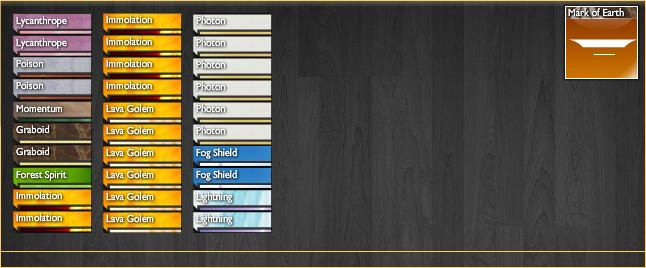
4vh 4vh 52o 52o 55q 590 590 5c1 5f9 5f9 5f9 5f9 5f9 5f9 5fa 5fa 5fa 5fa 5fa 5fa 5l9 5l9 5l9 5l9 5l9 5l9 5og 5og 61q 61q 8pm
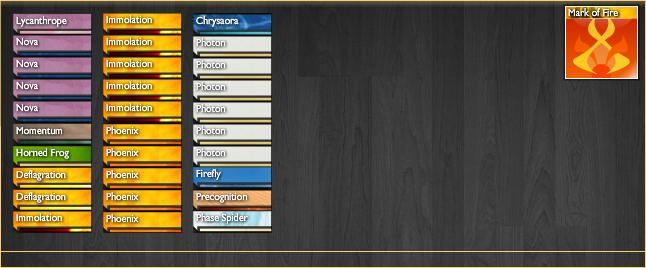
4vh 4vj 4vj 4vj 4vj 55q 5bu 5f6 5f6 5f9 5f9 5f9 5f9 5f9 5f9 5fc 5fc 5fc 5fc 5fc 5i5 5l9 5l9 5l9 5l9 5l9 5l9 5ok 5rr 620 8po

4sa 4sa 4sa 4sa 4vj 4vj 4vj 4vj 4vj 4vj 52j 55v 58v 5bu 5bu 5bu 5bu 5bu 5c7 5c7 5c7 5c7 5c7 5f6 5i6 5lb 5ok 5rh 5ut 61q 8pn
The first deck is a simple grabbow, using brute force to rush. There's 5 QPs there, allowing for slightly more quanta usage. Deck 2 is a powerful immobow, following the same strategy of a brute rush. Notice that immobows should use slightly less quanta of each element than a QPbow. Deck 3 is another example of an immobow with different cards. Deck 4, is a lifebow. A deck that uses lots of cheap hitters and adrenaline to boost their attacks.
Generally, when making a rainbow, you want some CC, PC, and rushing power all rolled into one. If you can, try and make it so that there's a synergy between the cards.
You'll sometimes notice that I did use rare weapons in the rainbows, but don't worry if you don't have any. A simple sword, hammer, or bow can also do in a pinch.
Rainbow building example
Let's start off building a rainbow. Say I want to synergize my deck around
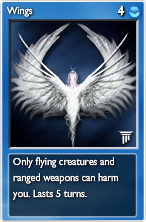

4sa 4sa 4sa 4sa 4vj 4vj 4vj 4vj 4vj 4vj 5oo 5oo 5oo 5oo 8pr
Wings by itself isn't going to do much, so we probably need some spiders to best make use of it.
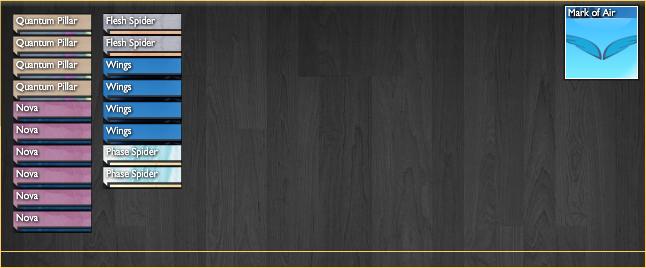
4sa 4sa 4sa 4sa 4vj 4vj 4vj 4vj 4vj 4vj 52j 52j 5oo 5oo 5oo 5oo 620 620 8pr
Eek. Seems like we're going to need slightly more quanta for this. This also doesn't have enough offense. Let's change that.
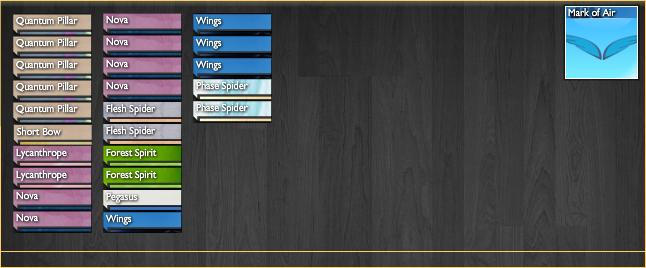
4sa 4sa 4sa 4sa 4sa 4tb 4vh 4vh 4vj 4vj 4vj 4vj 4vj 4vj 52j 52j 5c1 5c1 5lb 5oo 5oo 5oo 5oo 620 620 8pr
We still have 5 cards left, so let's start filling those up.
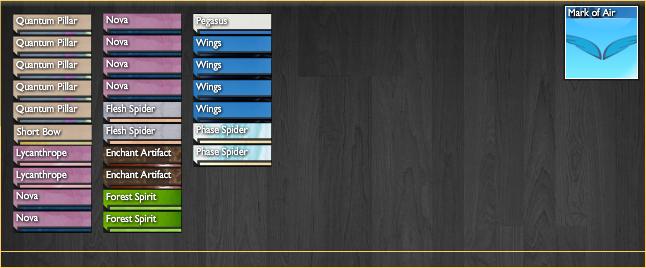
4sa 4sa 4sa 4sa 4sa 4tb 4vh 4vh 4vj 4vj 4vj 4vj 4vj 4vj 52j 52j 592 592 5c1 5c1 5lb 5oo 5oo 5oo 5oo 620 620 8pr
Don't want our precious wings being stolen.

4sa 4sa 4sa 4sa 4sa 4tb 4vh 4vh 4vj 4vj 4vj 4vj 4vj 4vj 52j 52j 592 592 5c1 5c1 5f6 5i7 5lb 5oo 5oo 5oo 5oo 5rk 620 620 8pr
And slip in some control. There. A 30 card rainbow focusing on wings.
It's important when building to know what your deck's strengths and weaknesses are. For example, this deck is all about using wings as defense, and as such, it sacrifices some of its offense (You don't see any graboids here do you?) The other weakness that this deck has it that there's only 1 PC card in the whole deck, one explosion. This will make mono aether (especially ones using phase dragons) an extreme pain. Remember, no deck is perfect, but you want to be as well rounded as possible, and that's the main advantage of rainbows.
Learning about and using the oracle
Every day, you will be given the option of going to the oracle and spin a card. What is the oracle? Allow me to explain.

A. Fortune. Each card has its own little fortune. Not too important to the gameplay, but adds a feeling of depth and lore to the game.
B. Electrum. Each day, the oracle gives you some electrum. Free electrum is never bad!
C. False god prediction. Each day, the oracle also predicts your next false god. False god decks can be found here, but look carefully. Unless you properly prepared a counter to the false god, you might find yourself crushed quickly! Alternatively, here is a link of all the False God counter decks.
D. Pet. Each time you spin the oracle, the oracle may bless you with a pet. The pet is often the cheapest creature of the element of the card that you spun (besides gravity and other, those don't get any pets), but occasionally, the pet will be ??? This means that it is a random creature. Pets will accompany you for your next 3 non-PvP battles as creatures on the last available creature slot.
E. Card. Since the 1.31 patch, the oracle ALWAYS gives you the card that you spun. The oracle is the only way to get nymphs besides tournaments, and it also gives you different restrictions on building an arena deck.
Guide to arena (Starting, bronze, and silver)
The arena is where the bulk of creativity and fun is. The arena is a place where you can submit your own deck, and battle other people's submitted decks. If you manage to get a win streak, you can get a special spin filled with all rares, and letting you respin the reels. Gold and Platinum special spins have all UPGRADED rares. You need 5 wins in a row for a bronze rarespin, 4 for silver, 3 for gold, and 2 for platinum. Be careful though! Bronze alone is probably harder than AI3 and platinum is on the level, if not higher than the difficulty of false gods.
Getting started

This is the main hub of the arena.
A. Click here to fight bronze league decks.
B. Click here to fight silver league decks.
C. Click here to fight gold league decks.
D. Click here to fight platinum league decks.
E. Click here to fight against your own arena deck to test it.
F. Click here to modify your arena deck.
G. Click here to collect all the electrum your arena deck has earned.
H. Click here to build a new arena deck using the oracle card you spun today.
Be warned though! When you fight arena decks, they often have benefits you don't, such as more health, double and triple marks, and even double draw. Your arena deck loses hp for each day it stays up. This is to inspire creativity and force players to keep making new decks.
How to build good arena decks

Before I go over how to build a good arena deck, I will first go over what the arena deck building means.
A. Stamina. You can increase your arena deck's hp up to 200. Costs 1 skill point for each 5 hp.
B. Wisdom. Limits how many upgraded cards you can use. 4 skill points to go from 5 to 10 to 20 to 30 to 60.
C. Intellect. Your mark multiplier. Your arena deck can have a single, double, or triple multiplier. Costs 10 skill points to increase.
D. Dexterity. Doubles your entire deck size as well as drawing speed. Costs 20 skill points.
E. Oracle card. You must use at least 5 copies of this card in your arena card. They are not removable. You do not have to actually own 5 copies of it though.
F. Level and skill points. Your level corresponds to your score. The higher your level, the more skill points you have to spend on building a good deck.
So how do I advise you to build an arena deck?
Use the advantages that you have over real players. Stamina is a big one. It's cheap and a good place to dump your unused skill points if you don't know what to do with it. Having more health lets you have more time to kill whoever is facing your arena deck. Wisdom isn't that important early on, but you'll definitely want to start investing in it once you've reached higher leagues and got more upped cards. Intellect is a slightly more tricky one. It costs an extremely expensive 10 skill points, but can work wonders if done right. Don't put skill points into this if you don't know how to use it or don't plan on using it a lot. Having a double or triple mark can help tremendously if done right. Dexterity is probably the skill that's the most important. For a hefty 20 points, it doubles your entire deck size and draw speed. The downside for it is that your arena deck will get slightly worse opening draws, but that is mitigated by having twice the amount of pillars and twice the amount of cards. To get a general idea for this, 6 dimensional shields allow for 18 turns of stalling. With dexterity, those 6 dimensional shields become 12 dimensional shields, allowing for 36 turns of stalling. If you only had 6 frogs previously, you now have 12 frogs to swarm your opponent. If you had 5 rage potions earlier, you now have 10. Dexterity is very deadly, and one of the best places to use your skill points. I'd advise you to nearly always invest in it if you can.
In general, my suggested priority would probably be dexterity first, mark or wisdom depending on whether you need more ups or quanta, and then put the rest of your points into hp. I'd generally suggest to try and keep your hp above 150 at least.
So how do you build a good arena deck? Let's go over some examples.
Card=Horned Frog

5bs 5bs 5bs 5bs 5bs 5bs 5bs 5bs 5bs 5bs 5bs 5bs 5bs 5bs 5bs 5bs 5bs 5bt 5bt 5bt 5bt 5bt 5bt 5bu 5bu 5bu 5bu 5bu 5bu 5c0 5c0 5c0 5c0 5c0 5c0 8pn
If you are truly out of ideas, a regular old rush will do fine. This would be a good time to use more marks or hp.
Card=Cloak
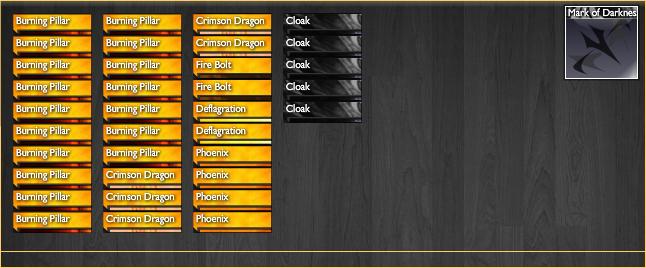
5f0 5f0 5f0 5f0 5f0 5f0 5f0 5f0 5f0 5f0 5f0 5f0 5f0 5f0 5f0 5f0 5f0 5f2 5f2 5f2 5f2 5f2 5f4 5f4 5f6 5f6 5fc 5fc 5fc 5fc 5v2 5v2 5v2 5v2 5v2 8pt
Remember splashes? Splashes are now way more powerful since you can have double or triple marks. With a double mark, you can splash in cards that cost from 4-6 quanta. With a triple mark, you can even easily splash expensive cards such as Parallel Universe into the deck of your choice.
Card=Short Bow
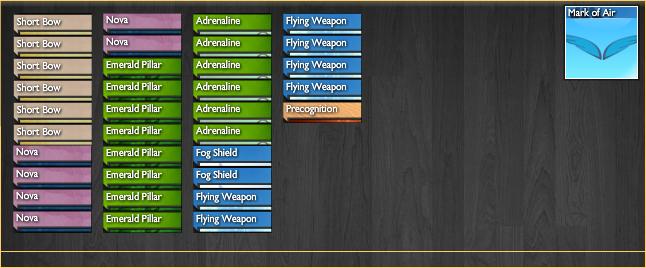
4tb 4tb 4tb 4tb 4tb 4tb 4vj 4vj 4vj 4vj 4vj 4vj 5bs 5bs 5bs 5bs 5bs 5bs 5bs 5bs 5c7 5c7 5c7 5c7 5c7 5c7 5og 5og 5oi 5oi 5oi 5oi 5oi 5oi 5rr 8pr
Have fun! Even though weapons and shields are harder to build decks around, don't forget your creativity and build fun decks. A fun deck that wins can win twice the electrum that a boring shrieker rush could.
If you're still out of ideas, you can go to the wiki here and look at the card you were given, learn its strengths, weaknesses, and synergies, then see where you go from there. Remember, there's two ways to really abuse your advantage in the Arena. Either go for a quick and speedy win with the advantage you have, or drag it out and let your advantage really show off in the long run. Build your deck around one of these two ideas, and remember, be creative and innovative!
Bronze and Silver
So how do you tackle the arena if they have so much more benefits than you? Let me tell you.
Stamina. They may have more health than you, but that doesn't mean their deck quality or the AI's thinking is better than yours. With enough speed or control, you can quickly win the game or seize control.
Wisdom. Lower tiers of the arena don't usually spend too much on this, so it's not really relevant. The big point here is, arena decks are restricted by how much upped cards they use, while you're not bound by anything. This is the only section where you can match them.
Intellect. Their mark is twice or thrice yours, so the quanta output will be way higher than yours in a while. Finish the game quickly, and try not to let the game drag out and for their advantage to be more apparent.
Dexterity. Their double draw is certainly an advantage, but upgrading dexterity means they have slightly worse opening hands on average. Use the first few turns to build your advantage before their double cards overwhelm you.
Common bronze and silver decks:
Monos, aether, darkness, death, water, fire, life
immobows, grabbows, rainbows
Arena is the best place to get rares/score/money if done right.

^(rarespin. Each reel can be individually spun up to 3 times)
Sadly, I really can't recommend any specific decks for arena since it always changes, but a fast rainbow could do pretty well in the bronze and silver leagues.
PvP1
Ahh. PvP. The main meat of the game. Here, where you get to test your deck against other players and duel with worthy opponents. This section covers PvP1, so you might be slightly disappointed. In PvP1, the metagame is small enough that you can easily learn all about it. Many newbies also like to head into PvP1 without any modifications to their decks. This means that they can be easy prey. So how to succeed in PvP1? Don't worry about it too much, since nearly any deck can do pretty well in PvP1, but generally, fast rushes, rainbows, and decks with permanent control (to deal with dimensional shields) will get you pretty far.
Unupped metagame
Of course, it'd be impossible to list out every single deck and strategy in PvP1, but Chapuz has a pretty neat guide on strategies and synergies available here.
After enough experience playing, you should be able to recognize your opponent's deck by turn 1, or even by the mark.
![]() mark=mono aether
mark=mono aether
![]() mark=mono darkness
mark=mono darkness
![]() mark=mono life
mark=mono life
![]() mark=mono death
mark=mono death
![]() mark=mono fire, fire immorush
mark=mono fire, fire immorush
![]() mark=grabbow, immorush
mark=grabbow, immorush
![]() mark=graboid rush
mark=graboid rush
![]() +
+ ![]() =firefly queens
=firefly queens
![]() +
+ ![]() =cats and bonewalls/yards or vultures
=cats and bonewalls/yards or vultures
![]() +
+ ![]() =firestall
=firestall
![]() +
+ ![]() =ghostmare
=ghostmare
![]() +
+ ![]() =adrenaline/Mitosis + Minor Vampires/devourers
=adrenaline/Mitosis + Minor Vampires/devourers
Gold
Goals
-Learn about upped cards
-Upping your first deck
-Play a bit with half-bloods
-Learn to build a SNbow
Slight overview on some upped cards



Ever since the last quest, you've had the option of upgrading cards. What are upgraded cards? Upgraded cards are cards that are "better" than unupped cards. For the most part, they tend to have higher stats, lower casting cost, and lower ability costs. There are some cards that deserve special mention for what happens when they get upgraded though.
- While supernova costs 2
 , it gives twice the amount of quanta nova does. Very powerful, and the basis for supernovabows that I will get to later.
, it gives twice the amount of quanta nova does. Very powerful, and the basis for supernovabows that I will get to later.
Horned Frog, Flesh Spider, Phase Spider, Sapphire Charger, Hematite Golem
- These cards, unupped were average creatures, upped, they become tremendously powerful, efficient attackers.
- Toadfish turns from a fierce attacker into a poisoner. Debatable which is better, although upped has great synergy with adrenaline.
- Phoenix was a powerful midrange hitter. Minor phoenix is a cheap hitter, but more efficient.
- Goes from 5|5 for 5
 to 2|4 for 1
to 2|4 for 1  . Much more spammable, as well as synergizing with Butterfly Effect.
. Much more spammable, as well as synergizing with Butterfly Effect.
- Chaos seed is a random CC card. Chaos power becomes the best (average) buff card.
- Uses all your quanta to absorb damage instead of just entropy quanta.
- Changes from +5/-5 to +6/-6.
Gnome Rider, Dragonfly, Ash Eater
- These cards all change when upped. Gnome rider and Dragonfly become free, while Ash eater starts generating
 .
.
- More attack, more doubling, much more power.
- Gains +1 cost, but gains an astounding +9hp.
- Costs a bit more, but guarantees mutants.
- Hits only the opponent's creatures, but gains +2
 casting cost.
casting cost.
- Upped FFQs produce upped fireflies, which have more attack, and generate
 instead of
instead of  .
.
- Now generates upgraded scarabs.
- Doubles in cost, but goes from 1|6 stats to 7|7.
Plate Armor, Oty
- Much more health. Much more devouring.
- Goes from 3 damage for 1 :rainbow to 6 damage for 1 :rainbow. Insane efficiency.
- No longer requires
 to use. Can now be splashed into any deck that wants flying weapons.
to use. Can now be splashed into any deck that wants flying weapons.
- Nearly triples damage output.
- Becomes free, no longer needing splash. Much more variability.
Pillars
- Makes the game go by much faster if you can get quanta instantly. This is usually why upped decks are a turn faster than unupped decks.
Upping your first deck
There's not much I can really recommend for a very first deck. Perhaps you'd want a fast AI3 grinder? Perhaps a supernovabow? Perhaps a really awesome deck nobody has ever seen before? Before you actually decide, you can go to the trainer here to play around a bit with different decks. The reason I didn't post this link earlier was that before, I wanted you to experiment and learn different types of decks. Now, for a fully upped deck, you've got to spend at least 45k electrum. You can easily buy all the unupped decks with a few thousand electrum, but upped decks are harder to come by, so think carefully before upping cards. Slowly work towards it, one card at a time to keep yourself motivated. To get electrum fast, either grind AI3, or go into the arena. Gold/Plat have one of the best places to make money. Don't forget to keep fighting the daily False God predicted by the Oracle.
Provoking the half-bloods
The main reason that I didn't mention half-bloods up until now is that they were probably too hard for you to face. Even with a fully upgraded deck, the chances of consistently, easily winning against half-bloods isn't that likely. Why is this the case?
-Half bloods have 150 hp. That means, they only need to do 2/3 of the work you have to do. If both of you use a rush, it's easy to see who comes out on top.
-They have a triple mark. That means they can pump out quanta way faster than you can, and get out expensive cards like dragons out earlier.
-They have double draw when they have less than 3 cards. This means they can pull off spectacular last minute saves if you're not prepared.
-Around 30% of their cards are upped. This may not mean much later, but it will be quite a challenge for the newbie who jumps straight to AI4 after AI3.
-Even by consistently winning, or EMing the half-bloods, the rewards (lowly electrum, small chance of winning cards) makes it not that efficient.
Now that we've seen the bad parts of them, what are the good parts?
-Their decks are random. This can be either good or bad, but mainly it means they don't have a definite strategy, so this often leads to them having slower starts.
-You can win upgraded cards from them. It's always nice winning a card worth 1000 electrum.
-You can predict what elements they will use
Predicting Half-Bloods
Each Half-blood deck is either a mono or duo. They also like to use quantum pillars, so black hole could be a help. Each half-blood name is made up of a suffix and prefix relating to a certain element.
![]() Ari | es
Ari | es
![]() Aeth | eric
Aeth | eric
![]() Shad | ow
Shad | ow
![]() Mor | tis
Mor | tis
![]() Ter | ra
Ter | ra
![]() Dis | cord
Dis | cord
![]() Pyr | ofuze
Pyr | ofuze
![]() Mas | sa
Mas | sa
![]() Vit | al
Vit | al
![]() Lum | iel
Lum | iel
![]() Chr | onos
Chr | onos
![]() Aqua | rius
Aqua | rius
Lumcord would be a light/entropy duo. Vitra would be a life/earth duo. Shadow would be a darkness mono. A half blood will always have a triple mark of the suffix, and use more cards of the prefix element.
Unlike the arena, there really is no way of successfully countering half-bloods since they're random. Due to the fact that they use monos/duos, though, discord and black hole could be a viable option.
Building a supernova based rainbow
A supernovabow is probably the defining feature of upgraded cards. Think about your unupped rainbow, and now increase its speed, quanta production, offense, defense, and everything else about it. That's right, everything is better, and I'm here to teach you how to build one.
Remember how I mentioned unupped rainbows should use no more than 5 quanta of an element? In a SNbow, that number jumps up to 7. While it may not look like a lot, this adds way more possibilities. A list of upgraded cards that cost less than 7 is here.
In addition to unupped cards mentioned above, I'll show which cards of which element are good in an SNbow. Any card mentioned above should still be good in an upped rainbow, and some cards, like graboid or frog become even more FANTASTIC.
![]() Twin Universe, Phase Shield, Quintessence, Phase Recluse, Mindgate
Twin Universe, Phase Shield, Quintessence, Phase Recluse, Mindgate
![]() Eagle's Eye, Elite Wyrm, Unstable Gas, Elite Queen
Eagle's Eye, Elite Wyrm, Unstable Gas, Elite Queen
![]() Gargoyle, Improved Dusk, Vampire
Gargoyle, Improved Dusk, Vampire
![]() Bone Wall, Flesh Recluse, Aflatoxin
Bone Wall, Flesh Recluse, Aflatoxin
![]() Chaos Power, Pandemonium, Maxwell's Demon, Dissipation Field, Fallen Druid
Chaos Power, Pandemonium, Maxwell's Demon, Dissipation Field, Fallen Druid
![]() Fire Buckler, Lava Destroyer, Fire Storm, Minor Phoenix
Fire Buckler, Lava Destroyer, Fire Storm, Minor Phoenix
![]() Elite Charger, Elite Otyugh, Graviton Guard
Elite Charger, Elite Otyugh, Graviton Guard
![]() Crusader, Morning Glory, Archangel
Crusader, Morning Glory, Archangel
![]() Turtle Shield, Electrum Hourglass, Eternity
Turtle Shield, Electrum Hourglass, Eternity
![]() Arctic Octopus, Steam Machine, Puffer Fish
Arctic Octopus, Steam Machine, Puffer Fish
You don't have to, but it's probably nice to have some synergy between the cards that you pack. Here are some examples.
Eagle Eye + Crusader + Otyugh + Bonewall for a CC and bonewall build
Discord + Black Hole for a denial with healing build
Wings + Recluses for damage and protection
Pulverizer + Crusader for extra Permanent control
Elite Firefly Queen + Fallen Druid for mutation fodder, although this eats up a lot of ![]()
This is the basic bone build of a SNbow before patch 1.31

6qq 6qq 6qq 6qq 6qq 6u3 6u3 6u3 6u3 6u3 6u3 8pj
This is often the basic bone build of a SNbow after the patch
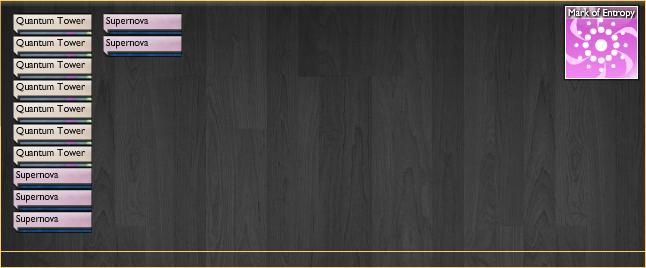
6qq 6qq 6qq 6qq 6qq 6qq 6qq 6u3 6u3 6u3 6u3 6u3 8pj
Here are some examples:
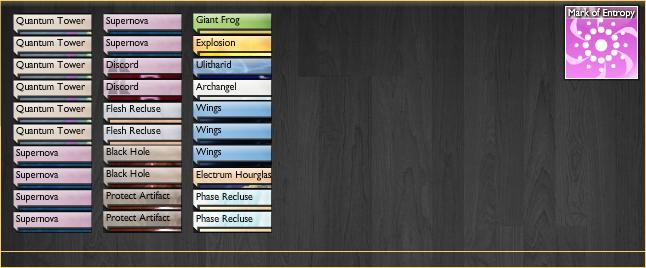
6qq 6qq 6qq 6qq 6qq 6qq 6u3 6u3 6u3 6u3 6u3 6u3 6u5 6u5 713 713 74f 74f 77i 77i 7ae 7dm 7gv 7ju 7n8 7n8 7n8 7q5 80g 80g 8pj
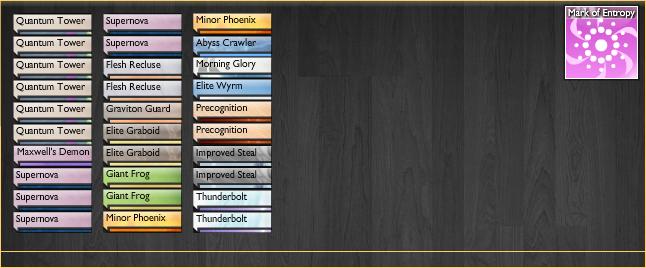
6qq 6qq 6qq 6qq 6qq 6qq 6tt 6u3 6u3 6u3 6u3 6u3 713 713 747 77g 77g 7ae 7ae 7ds 7ds 7gm 7k1 7mu 7qb 7qb 7t9 7t9 80a 80a 8pj

6qq 6qq 6qq 6qq 6qq 6qq 6qq 6u2 6u2 6u3 6u3 6u3 6u3 6u3 71b 74a 77f 77f 7ah 7ah 7do 7ds 7gu 7k5 7n3 7q5 7qb 7tf 80k 80k 8pj
The first deck is like an upped version of the regular rainbow made above. It focuses on using wings and recluses for defense, as well as having a discord+black hole combo inside. The second uses slightly cheaper creatures, focusing more on "spamming" cheap creatures. The third deck has a slightly more control and defensive feel to it. Note how deck 3 has more towers though, that's why it can afford slightly more expensive cards.
PSNbows
A PSNbow is a pendulum supernova bow. It is a type of SNbow that uses pendulums to generate quanta instead of quantum towers. This makes the quanta generation less, but it keeps the speed of SNbows, as well as having specializing in the elements of ![]() and the mark element.
and the mark element.
The 1.31 patch hasn't seemed to upset the balance of many PSNbows, so here is the basic bone build of a PSNbow (mark not there because it's up to you)
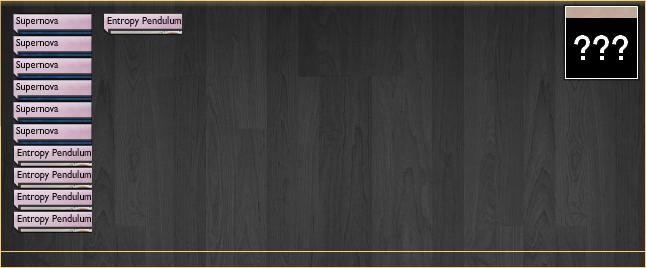
6u3 6u3 6u3 6u3 6u3 6u3 6ve 6ve 6ve 6ve 6ve
The advantages of using pendulums means that a guaranteed supernova can be played second turn as long as a pendulum is drawn. When using a PSNbow, try to keep the quanta of other elements around 4 or 5, with entropy usage around 5 or 6, and your mark usage around 8 or 9. It also depends on how many pendulums you use. Here are some examples:

6u2 6u2 6u3 6u3 6u3 6u3 6u3 6u3 6ve 6ve 6ve 6ve 6ve 718 718 77g 77g 77g 77g 7ae 7ae 7ds 7ds 7gm 7jr 7n0 7q1 7tb 80a 80a 8pm

6u3 6u3 6u3 6u3 6u3 6u3 6u5 6u5 6u5 6ve 6ve 6ve 6ve 6ve 6ve 74f 74f 74f 74f 74f 77j 77j 7ae 7ae 7dm 7jr 7q4 7q4 7th 80a 8pl

6u1 6u1 6u3 6u3 6u3 6u3 6u3 6u3 6ve 6ve 6ve 6ve 6ve 71a 74a 74a 77a 7ae 7ae 7dm 7dm 7dr 7ds 7ds 7ds 7gl 7gl 7jv 7n4 7q1 8po
Deck 1 is a graboid PSNbow, focusing on the speed and power of graboids. Deck 2 is another discord+black hole combo, with extra denial like Rewind and Nightmare and Quicksand. Deck 3 is a fire PSNbow, focusing on fire's completeness of having both PC, CC, and speed.
Conclusion to SNbows
No matter how you slice them, the supernovabow is the most flexible deck archetype there is. The very iconic entropy mark or entropy pendulums signify a powerful deck that has many surprises. Use these decks for their speed and adaptability. I'd advise getting a SNbow quickly, since their wide range of abilities allows for them to have counters against many different deck archetypes. There's nearly infinite variations of an SNbow, so experiment with them until you find one that makes you feel most comfortable. I didn't go over a step by step example of building an example this time, to let you actually try your hand at it without any real guidance. Use the link above to find your favorite cards, and slowly piece together your SNbow. It'd be nice if it had some synergy between your cards, but having a bit of PC and CC is nearly a must. If you're still looking for ideas on how to build a good SNbow, take a look at Willng3's compilation of SNbows here. Again, don't completely copy the decks, see the strengths and weaknesses of each, analyze them, then figure out how to use that knowledge to make your SNbow, better.
Not fully upped False God farming
When farming False Gods without a fully upped deck, remember, your win rate will be very low. You will lose electrum. You will lose score. So why do it? Even if your win rate is low and you keep losing electrum, if you happen to win and get a card from a spin, that's 1000 electrum right there. Enough to let you fight 30 more False Gods. The whole profit from this is to get upgraded cards, and sell them.
No ups at all
Trying to farm False Gods with no upgrades at all is not really recommended, but if you do insist, there are two ways to do it.
Mono Aether: Some False Gods have no permanent control whatsoever. This means that you can chain dimensional shields to save yourself, while slowly dealing damage with your immortal creatures.
6 ups
This post on the forums has a list of community recommended decks for fighting False Gods with only 6 upgrades. Many people often would recommend upgrading 6 photons into rays of light to build rol/hope, but the best deck to kill False Gods with only 6 upgrades is Limitless Speed OTK by Chapuz.
Limitless Speed OTK
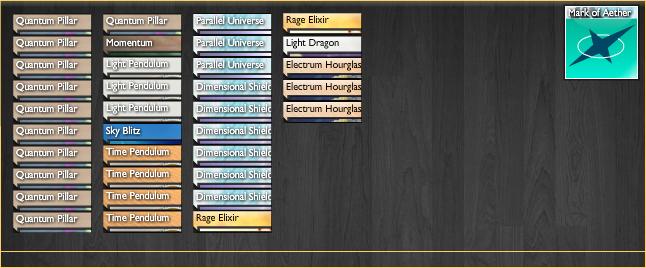
4sa 4sa 4sa 4sa 4sa 4sa 4sa 4sa 4sa 4sa 4sa 55q 5mq 5mq 5mq 5op 5t2 5t2 5t2 5t2 61r 61r 61r 61t 61t 61t 61t 61t 61t 7dr 7dr 7jq 7q5 7q5 7q5 8pu
Limitless Speed OTK is a deck meant to stall and kill a False God in one hit. The combo goes like this:
"Light dragon + momentum + 2x Rage Elixir + 3 Parallel Universe + Sky Blitz: [(12 + 1 + 2x6) x 2] x 4 = 25 x 2 x 4 = 50x4 = 200 UNSTOPPABLE ONE TURN DAMAGE."
This deck requires no rares at all, so it's quite newb friendly, but it does require those 6 upgrades, making it cost at least 9000 electrum. The good thing is, hourglasses are pretty common cards in other decks, so it really isn't a big deal to up 3 of them. Don't worry if you feel the win rate is too low or you're losing too much electrum and score. This deck has about a 30% win rate vs False Gods, so you should still be earning a profit by selling the upgraded cards that you win.
Platinum
Goals
-Learn about Shards
-Learn about the Upped metagame and PvP2
-Learn about the higher leagues in the arena
-Learn to farm False gods
-Learn to get creative
Shards
No doubt that while playing the game, you've seen shards somewhere. It could've been another player, the arena, or in a special spin, but either way, the impact that the shards make on the game is huge. Especially in the upped metagame. You can read about each of the shards here, but I'm going to give a general overview over each Shard and the element they're aligned with. (Going in the order that the wiki has them on the page). Acronyms also included.
![]() Shard of Divinity SoD
A good card for some quick healing if you're not one of those healing elements.
Shard of Divinity SoD
A good card for some quick healing if you're not one of those healing elements.
![]() Shard of Gratitude SoG
A pretty decent passive healing card, but only that useful if you have a life mark.
Shard of Gratitude SoG
A pretty decent passive healing card, but only that useful if you have a life mark.
![]() Shard of Readiness SoR
Turns a creature's ability to 0. Very good in duos where balancing quanta can get hard. Also use with time creatures for way more effect.
Shard of Readiness SoR
Turns a creature's ability to 0. Very good in duos where balancing quanta can get hard. Also use with time creatures for way more effect.
![]() Shard of Sacrifice SoSa
A very powerful card. For the cost of 40hp and all your quanta besides death, you get healed instead of damaged for two turns. Activate this when your opponent has 20 or more damage on the field to get back your health. You can even use this if they have 10 or more damage and it'd still be better than just taking the damage.
Shard of Sacrifice SoSa
A very powerful card. For the cost of 40hp and all your quanta besides death, you get healed instead of damaged for two turns. Activate this when your opponent has 20 or more damage on the field to get back your health. You can even use this if they have 10 or more damage and it'd still be better than just taking the damage.
![]() Shard of Void SoV
Card that slowly lowers your opponent's maximum health. Not that strong without a darkness mark, and even then, not that useful unless you center your entire deck strategy around it.
Shard of Void SoV
Card that slowly lowers your opponent's maximum health. Not that strong without a darkness mark, and even then, not that useful unless you center your entire deck strategy around it.
![]() Shard of Patience SoP
The main use this card has is a stall breaker. If your opponent has too big of a shield, or is healing too much, use this to build up enough damage for an OTK.
Shard of Patience SoP
The main use this card has is a stall breaker. If your opponent has too big of a shield, or is healing too much, use this to build up enough damage for an OTK.
![]() Shard of Serendipity SoSe
A very fun card that seems like it was designed for rainbow decks. Generates three random cards with one of them being guaranteed as entropy. If you have space and spare quanta in your rainbow, pack some of these in.
Shard of Serendipity SoSe
A very fun card that seems like it was designed for rainbow decks. Generates three random cards with one of them being guaranteed as entropy. If you have space and spare quanta in your rainbow, pack some of these in.
![]() Shard of Focus SoFo
A very broken and powerful card. It starts out as a creature, and can destroy 3 permanents in 3 turns, then drops off a Black Hole in your hand. With this, rainbow decks don't even have to pack in PC anymore.
Shard of Focus SoFo
A very broken and powerful card. It starts out as a creature, and can destroy 3 permanents in 3 turns, then drops off a Black Hole in your hand. With this, rainbow decks don't even have to pack in PC anymore.
![]() Shard of Bravery SoBe
A card that fits great in decks that need draw power. It allows the user to draw up to 3 cards just by playing it, but it also lets the opponent draw as well.
Shard of Bravery SoBe
A card that fits great in decks that need draw power. It allows the user to draw up to 3 cards just by playing it, but it also lets the opponent draw as well.
![]() Shard of Integrity SoI
A card that makes its own genre of decks, shard golem decks. If you plan on building a shard golem deck, use these, if not, don't.
Shard of Integrity SoI
A card that makes its own genre of decks, shard golem decks. If you plan on building a shard golem deck, use these, if not, don't.
![]() Shard of Wisdom SoW
Gives 4 attack to immortal creatures and allows them to bypass most shields. These can be used either offensively for more damage, or defensively, to reflect damage.
Shard of Wisdom SoW
Gives 4 attack to immortal creatures and allows them to bypass most shields. These can be used either offensively for more damage, or defensively, to reflect damage.
![]() Shard of Freedom SoFre
A card that gives airborne creatures a chance to critical hit (1.5*damage, and bypass shields) and gives the creature a chance to dodge attacks if it's an air creature. The effect stacks, so 4 of these would mean guaranteed critical hits.
Shard of Freedom SoFre
A card that gives airborne creatures a chance to critical hit (1.5*damage, and bypass shields) and gives the creature a chance to dodge attacks if it's an air creature. The effect stacks, so 4 of these would mean guaranteed critical hits.
PvP2
Ah. PvP2, the unrestricted metagame. PvP2 is actually quite decent for getting money and score, but don't expect it to be too profitable. Generally, if you want to have a good time here, be packing at least half upped cards in your deck. Expect to see lots of upgraded decks and shards. Shards everywhere.
Upped metagame
What is in the upped metagame? Again, there are way too many strategies to list them all, but here are a few that I've seen that appear quite often.
- Unupped decks
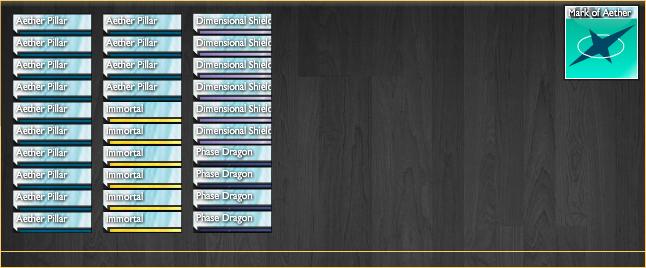
61o 61o 61o 61o 61o 61o 61o 61o 61o 61o 61o 61o 61o 61o 61s 61s 61s 61s 61s 61s 61t 61t 61t 61t 61t 61t 61v 61v 61v 61v 8pu
Maybe he's just a noob who clicked the wrong button, or someone who wants to see if they can take on a vet. They shouldn't be too hard without upgrades, but they can come packing annoying cards like dimensional shields.
- Rainbows
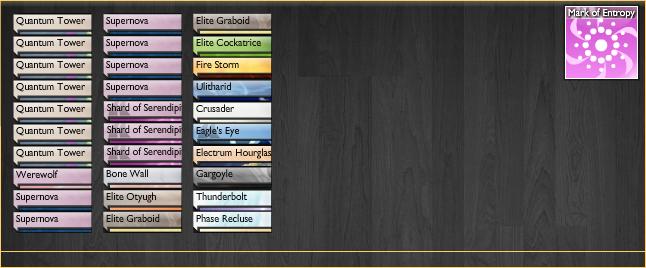
6qq 6qq 6qq 6qq 6qq 6qq 6qq 6u1 6u3 6u3 6u3 6u3 6u3 6u3 6uq 6uq 6uq 71b 74b 77g 77g 7ag 7do 7gv 7k5 7n5 7q5 7tf 80a 80g 8pj
Expect fast SNbows with rushing capabilities as well as control.
- Shard based decks

4vj 4vj 4vj 4vj 4vj 4vj 752 752 752 752 752 752 786 786 786 786 786 786 7ee 7ee 7ee 7ee 7ee 7ee 7u2 7u2 7u2 7u2 7u2 7u2 8pm
These include Instosis and SoSac dial, but also relate to others like mono aether with SoW or SoR being used on steam machines.
- Monos

7t4 7t4 7t4 7t4 7t4 7t4 7t4 7t4 7t4 7t4 7t4 7t6 7t6 7t6 7t6 7t6 7t6 7t8 7t9 7t9 7ta 7ta 7tb 7td 7td 7td 7td 7td 7td 7ti 8pt

710 710 710 710 710 710 710 710 710 710 713 713 713 713 713 713 718 718 718 718 718 718 71a 71a 71u 71u 71u 71u 71u 71u 8pk
Yup. Monos are still around, even in this high level of play. Don't underestimate the speed and versatility of them. Especially be wary of fire, darkness, and death. Aether and entropy may also be a pain.
- Denial decks
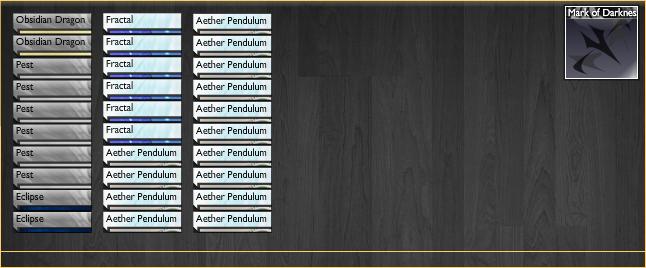
7t5 7t5 7t6 7t6 7t6 7t6 7t6 7t6 7ta 7ta 80i 80i 80i 80i 80i 80i 81q 81q 81q 81q 81q 81q 81q 81q 81q 81q 81q 81q 81q 81q 8pt
Expect lots of pests, discord+black hole, EQ, and other annoying decks in PvP2 as well.
Finally, remember, other people playing the game also want to experiment and have fun with the game. Don't be surprised if you see a new and interesting deck making use of a synergy you've never seen before.
In conclusion, be prepared to see a lot of different decks, but don't expect PvP2 to be easy. If you still don't have any idea about the PvP metagame, there's a small compilation of PvP recommended decks here. Take a look at them for ideas if you need to.
Gold and Platinum league
Higher leagues of the arena seem to be filled with decks using upgraded cards. Your advantage of having more upgrades than them might be moot at this point, so it comes down to luck and deckbuilding. Higher leagues of the arena have much more benefits than lower leagues, but there's still two ways you can take them. One is a slow "defend yourself until you can set up your strategy" that is seen in False God killers, and the other is just a straight up rush. If I were to recommend a deck for these higher up arenas, it'd probably be a SNbow for their flexibility and speed. If you plan on using a rush, be sure that it is a fast rush, because getting outrushed by a turn from Platinum is just annoying. The thing is about higher leagues is though, you don't need to have a spectacular win rate. The electrum rewards that you get easily outstrip the electrum you lose. Even if a deck had only a 50% chance of winning, the difference in reward and loss means that you'll rake in plenty of electrum by the end of the day. Gold and Platinum league is one of the best places to get electrum and score in the game.
Some common high league decks
Monos. Mono decks, especially fire, death, entropy, aether, and darkness are extremely powerful with multiple marks, twice your health, and double draw.
SNbows. Expect to see a lot of entropy marks and SNbows. This alone means that black hole can get you pretty far.
Immobows. Still here, still powerful.
Interesting splashes. Nightmare in a water deck? Phase shield used in a death deck? Be on the look out for interesting splashes.
Creative decks. Higher league often have more creative decks finding new ways around their oracle card. They may not be that difficult, but their advantages may balance the battle.
Farming False Gods
You should still be going to the oracle each day to find which False God comes next and counter them, but by this point, you should have plenty of money and rares to build yourself a nice FG killer. A FG killer is a deck that can reliably kill FGs most of the time, and with a high winrate, you should be able to win plenty of upped cards that you can sell for over 1000 electrum each. A list of good FG killers, (upped) can be found here.
Famous FG killers
So far in this tutorial, I've tried to avoid linking any specific deck to try and inspire creativity, but for FG killing, it's quite hard to come up with an original powerful deck. This is why I am linking two of the most powerful FG killers here.
Instosis

6u3 6u3 6u3 6u3 6u3 6u3 74g 7ap 7n9 7q0 7q0 7q0 7q0 7q0 7q0 7q5 7q5 7q5 7q5 7q6 7q9 7q9 7q9 7q9 7q9 7q9 7qu 7qu 7qu 7qu 8pj
Instosis actually has its own article on the wiki, so I won't go too far in about the strategy, but mainly, it boils down to using sundials and hourglasses to stall and draw your entire deck so you can use the mitosis+SoR+Dragon combo for an OTK.
Poison Dials SoSac
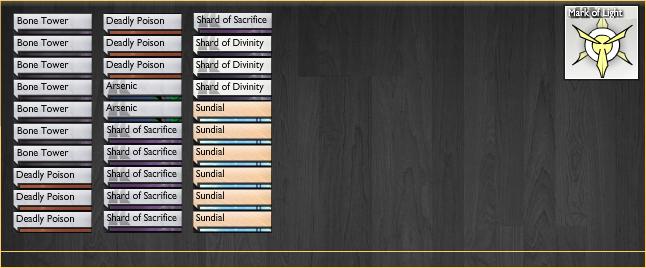
710 710 710 710 710 710 710 718 718 718 718 718 718 71a 71a 71u 71u 71u 71u 71u 71u 7km 7km 7km 7q9 7q9 7q9 7q9 7q9 7q9 8pq
SoSac Dials is another FG killer made by the same person who made Instosis, Sevs. The strategy involves using poison and arsenic to whittle down the FG's health while using sundials and SoSac to keep yourself alive.
Creativity
By this point in the game, you have plenty of rares, shards, money, and score. Use this time to go develop some interesting new deck ideas! Retain the creativity you had back when you first started out to experiment and have fun! The possibilities are endless.
Forums
Goals
-Get started with the forum
-Start posting
-Join PvP events
-Getting well known
-Becoming a veteran
Getting started
Before actually getting started, take a look at a very helpful guide on how to be a productive member of the forum by Absol here. After reading the rules, introduce yourself to the forum here.
Posting
The forum is comprised of two parts, the main forum, and the chat. Don't be afraid to stop by the chat to say hello and meet some new friends. For posting, generally you want to speak your mind, but do so in a courteous way. If you've followed the tutorial up to now, you should have quite enough experience and gameplay knowledge to post informative posts. Stop by the deck help section and advise that new player how to tweak his deck. Maybe you have your own idea you want to post in the deck ideas section. Maybe you have an idea on how to improve the game? Which cards to be nerfed or buffed? Post! As a general guideline though, bumping long dead threads and spamming is looked down upon, so try to keep your posts informative, courteous, and knowledgeable.
PvP
Sooner or later, the PvE such as arena, half-bloods, and False Gods will get boring. Wouldn't it be a great idea to spice up the game a bit? Each week, the forum hosts a tournament with special deckbuilding restrictions. Winners can win marks, nymphs, and electrum. Additionally, there are PvP leagues for you to find other forum members and challenge them to matches. Finally, there are PvP competitions every now and then, with the largest being War, a full scale battle between all the elements vying for which is the best. Well, what are you waiting for? Go there and start PvPing with people!
Getting well known
There's really no secret to this. Either post a lot, post high quality posts, stay in chat a lot, or be a PvP monster. Regardless, just by spending time on the forums, your reputation will get bigger.
Becoming a veteran
If you've actually read this tutorial, gone from bronze to plat, and joined the forums, congratulations! You're already a veteran! You've learned the game inside-out, you've created a few unique decks, and you have plenty of experience under your belt. Continue to use that creativity you have inside to keep up the experimentation and deckbuilding! The possibilities from here on out are endless.